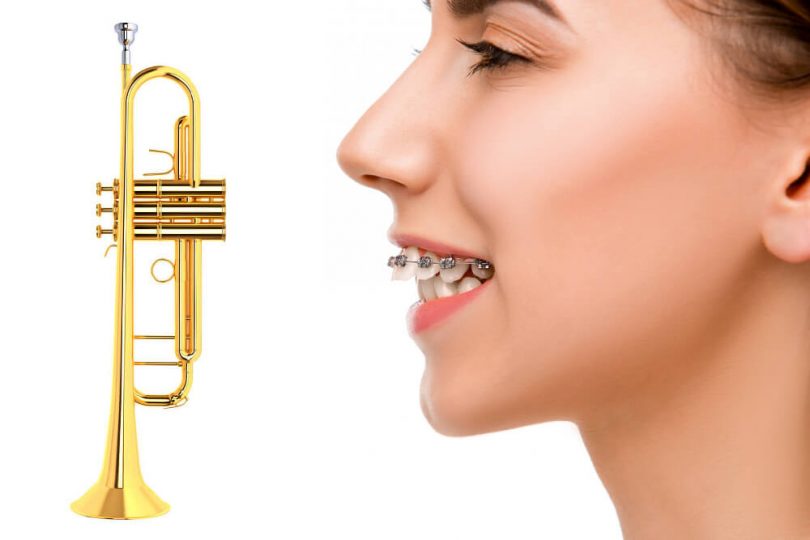Braces, piercings and dentures can be a challenge for anyone who wants to play the trumpet. It’s not just a matter of age or gender: even if you have braces, missing teeth, dental work or dentures-you can still learn how to play your instrument!
Braces, piercings and dentures are not an obstacle to playing the trumpet! In fact, many professional trumpet players have braces, piercings or dentures. The only thing that might get in the way of your trumpet playing is your mouth. If you have braces, missing teeth, dental work, or even dentures-that’s not going to stop you from playing your beautiful instrument!
So don’t let anything hold you back from learning to play the trumpet. Many people think that they can’t play the trumpet because of their appearance, but that’s simply not true. With a little bit of practice, you can be playing the trumpet like a pro!
Learn how to play with braces, piercings or dentures
Playing a brass instrument with braces, piercings or dentures is not impossible. However, you will need to adjust your embouchure and mouth position to accommodate the new space between teeth and mouthpiece.
You can still play good with these kind of oral-facial appliances, you just need to work a little harder to get the best tone quality possible.
If you have braces or are wearing retainers, your embouchure will change because of the extra space between your teeth. This means that there is more potential for air leakage when you play, and it takes a lot more effort to keep your sound together. Your teeth need to be as close as possible, but not touching the mouthpiece. At the same time you want your lips and cheeks (inside and out) to be relaxed and easy with no tension, which is most easily achieved with good air support from your diaphragm.
For your mouth position when you play, see if you can get your bottom lip to cover the band of braces at all times. You will also want to keep your mouth very relaxed so that when you play high notes, no part of your mouth blocks the sound. This is difficult when there are braces in between teeth, but with practice it can be done..
Piercings in your cheeks, lips, and tongue can cause the same problems as braces when playing trumpet. There is more air leakage so you have to work harder to get a good tone quality. This means using the proper embouchure for brass instrument playing with good air support from your diaphragm. You will also want your mouth to be relaxed and not block the sound when you play.
If you have dentures, there is no need for concern when playing trumpet. Dentures can move around in your mouth so they may cause some extra noise between the teeth, but that will not affect the quality of your trumpet playing at all.
As long as you use correct embouchure when playing trumpet, you can successfully play with any kind of oral-facial appliances. If you are having problems getting the proper tone quality or keeping your sound together between notes, there may be other factors in your technique that need to be addressed.
Factors for playing trumpet with Braces, Piercings, Dentures
One of the most important tips for playing trumpet with braces, piercings or dentures is to start with a mouthpiece that’s right for you. If your mouth is small, you need a mouthpiece that’s also small. If your mouth is large, you need a mouthpiece that’s larger.
For anyone who has braces, the mouthpiece should go over them carefully and be put on so it cannot move up or down. The next step for someone with braces is to attach the thumb strap to the instrument carefully and securely. If this isn’t done properly, it will cause the instrument to slip out of hand and hurt someone-not just yourself!
The next step for someone with piercings is to make sure that the instrument doesn’t touch them. If you have piercings in your lip, make sure that the trumpet bell is at least an inch away from it to avoid any pain or problems like bleeding. The same rule applies if you wear braces and have piercings near where the braces attach to your teeth. You should first move the braces out of the way and then attach the thumb strap.
The next step for someone with dentures is to make sure that they don’t get in the way of playing. If you have any doubts, take them out before playing so you don’t hurt yourself or muffle your sound on accident. If you have a denture plate or some sort of dental work over your teeth, make sure that the mouthpiece covers it to avoid damage.
A trumpet can be a beautiful addition to any ensemble and musical performance if you know which mouthpiece to get and how to put it on right. If you have braces, piercings or dentures-that’s not going to stop you from playing your beautiful instrument!
Benefits of playing the Trumpet with Braces, Piercings, Dentures
Playing the trumpet is a great way to get your mouth in shape for when you’re done wearing braces, getting pierced, or losing teeth. The muscles involved in playing the trumpet are used in many other activities. Playing the trumpet can also help you to improve your speech while also providing entertainment for yourself and others, since it doesn’t take much time to play a song on the trumpet.
Trumpet playing can be done at any age. There are no physical limitations on the trumpet either, unless you’re missing teeth or have dental work. If you do then it’s not impossible to play your instrument. You just might need to get creative when it comes to the amount of pressure that you use in blowing out your trumpet notes.
For example, you can use your tongue to help seal off some of the holes when playing. This helps create less air pressure in your mouth and keeps your lips from flying off your teeth! You can also try pushing on a few valves while pressing different parts of the trumpet against your lips. For example, if you’re having trouble hitting a certain note, you can press the side of your mouthpiece against your lip, then try playing that same note.
Conclusion
The most important thing is to keep practicing. It might take a little bit of time, but you’ll get there eventually! Never let anything stop you from learning to play the trumpet! Thank you for your time.







